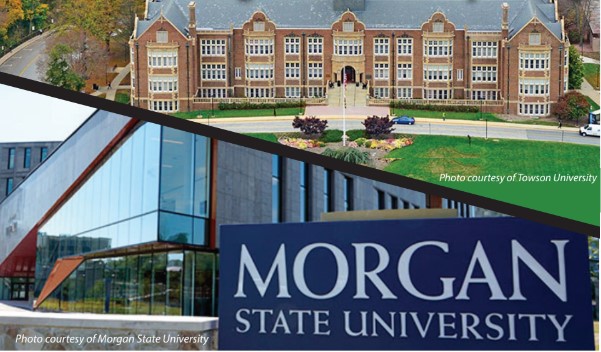By Catherine Pugh,
Special to the AFRO
Two years ago Maryland’s Historically Black Colleges and Universities (HBCUs) settled a 15-year lawsuit that sought to rectify unfair funding of institutions in comparison to other universities in the state. The same lawsuit addressed the trend of predominantly White institutions (PWIs) duplicating HBCU programs, ultimately causing a loss of enrollment for Black schools.
Now, the matter of program duplication is back on the table, as Towson University (TU) , a PWI in Baltimore County, has been given permission to begin a doctoral business program– similar to the one offered just miles away in Baltimore City at Morgan State University (MSU).
Since 2001, MSU has offered a Doctoral Program in Business Administration. However, neither that fact nor the outcome of the HBCU equity trial stopped Towson University from submitting a request to approve a Doctoral Program in Business Administration to the Maryland Higher Education Commission (MHEC).
When MHEC received the request in January 2023, they announced that TU followed all the proper protocols and procedures, prompting MSU President Dr. David K. Wilson to submit a letter of objection. In his letter, Wilson cited the similarities and stated that both programs “will teach students to teach classes in the fields of information systems and supply change management as well as prepare students to share their research findings.”
Initially, an MHEC official agreed that approving the program would be an act of program duplication.
In a letter on April 7, 2023, Assistant Secretary for Academic Affairs for MHEC, Emily Dow, Ph.D., wrote to Interim President of TU, Meanie Perreault, Ph.D., saying:
“I am writing to inform you [that] the proposed program is denied. This decision is based on an analysis of the program proposed in conjunction with the law and regulations governing academic program approval, in particular the Code of Maryland Regulations (COMAR) 13B.02.03. We conducted a careful analysis of the proposal, objection and response regarding the proposed and existing doctoral programs. Through our analysis, we have determined that the proposed program at Towson is unreasonably duplicative of two specific concentrations within the Ph.D. Business Administration program at Morgan: the Information Systems and the Supply Chain and Logistics Management concentrations.”
In her letter Dow, on behalf of MHEC, went on to say, “We believe allowing such duplication would cause demonstrable harm to Morgan.”
The letter also urged Towson to consult with MSU and other Maryland universities, should they wish to pursue a doctoral business program different from those offered at MSU and other
TU administrators decided to appeal the decision, as Dow’s April 7 letter noted that an appeal to the full Commission could be made according to COMAR 13B.02.03.28. if Chair Mary Pat Seurcamp received the request in writing within 10 days of the date of the letter.
On June 4, with seven members of the MHEC present, Chair Seurkamp, Vice Chair Charles McDaniel Jr., Vivian S. Boyd, James E. Coleman, Barbara Kerr Howe, Ray Serrano and Rebecca Taber Staeheline, a vote was taken to go into a closed-door session to discuss the proposal. In that close-door session, the seven MHEC members present took a vote that ultimately overrode Dow’s conclusion. The MHEC officials decided to overturn Dow’s initial conclusion that approving the TU doctoral program in question would amount to program duplication, causing harm to MSU.
Towson earned the right to begin their Doctoral Program in Business Administration with a 4-3 vote.
Wilson responded to the appealed decision in a June 30, letter, asking the Chair of the Education, Energy and Environment Committee in the Senate, Senator Brian J. Feldman and Chair of the Ways and Means Committee in the House, Delegate Vanessa Atterbury to intervene. Both oversee policy and laws enacted regarding education.
Wilson wrote, “It seems to me that the bill that legislatively settled the long-running HBCU lawsuit in 2021 explicitly required that a process be established to prohibit unnecessary program duplication going forward.”
“It was my understanding,” said Wilson, that “until such processes and procedures were put in place, no action would be taken by MHEC that would harm the state’s HBCUs.”
Former Senator Joan Carter Conway weighed in on the issue, saying that “there needs to be an established policy that requires a two-thirds vote by the Commission to duplicate any university programs or similar programs. Towson, however, is asking to establish a Ph.D. program that has been in existence for over two decades at Morgan and it is wrong.”
Legislators have also begun to cry foul on the fact that MHEC took the vote to approve TU’s program without all members present. MHEC has 12 members, but only seven participated in the vote that gave TU permission to offer their doctoral business degree, with MSU’s program less than six miles away.
“When I first read this, I thought it was Groundhog Day,” said State Senator Charles Sydnor. “MHEC’s decision, like any other governing body, must comply with the law. Not only is there a judge’s order, which exists because of similar unlawful behavior, but there is a statute which I believe the Commission violated.”
Syndor said that “while the law states that the Commission’s quorum consists of seven commissioners, the law prohibits MHEC from taking a “formal action” without the approval of a majority of the 12 commissioners serving on the commission.”
“I cannot imagine any act being more formal than the establishment of a new university program,” Sydnor told the AFRO. “Yet, when the Commission voted to establish this program, there were only four commissioners– not the seven commissioners required by law– who voted affirmative on behalf of Towson. I believe the plain language of the law calls this action into question and I would argue that the Commission’s action was unlawful.”
State Senator Mary Washington, who serves District 43 where Morgan State University is located, said she has been in contact with President Wilson.
“I supported and encouraged his decision to write to my Committee Chairman. The legislature just appointed a work group under House Bill 200 (HB 200) to assess the policies of MHEC [and] make recommendations on MHEC’s approval process. Their report is due December 31. Our committee looks forward to receiving those recommendations.”
The language in HB 200 requires the workgroup to make decisions including how to ensure that the approval process complies with applicable laws and legal precedents with respect to the state’s HBCUs.
HB 200 also prohibits the spending of $2.5 million in funds “until a report is submitted on recommendations to improve MHEC’s academic program approval process by making it a transparent, efficient, evidence-based and timely process that allows institutions the flexibility to respond to the needs of the students and State.”
The AFRO contacted Dow regarding the issue, but requests for comment were referred to MHEC Director of Communications Rhonda Wardlaw.
In response, Wardlaw wrote, “MHEC was copied on President’ Wilson’s letter to the General Assembly. However, the process is completed, and no further action is being requested of the Commission.”
On June 28th, two days before the expiration of her term as Chair of MHEC, Mary Pat Seurkamp, Ph.D., emailed a letter to Towson State University Interim President, Dr. Melanie Perreault, stating the Commission has voted to overturn the Assistant Secretary’s decision to deny approval of the proposed program. This decision was not unanimous. The letter went on to say, “ that there was insufficient evidence of demonstrable harm to the existing program at Morgan.”
On July 17 Maryland Governor Wes Moore appointed six new members to MHEC, naming Catherine Motz, Executive Director of the College Bound Foundation in Baltimore as chair. Other members appointed by Moore include Charlene Mickens Duke, Sheila Thompson, Mickey Burnim, Janet Wormack and Tanya Johnson. Moore appointed Rebecca Taber Staeheline earlier this year and will soon appoint another member to the Commission to replace James Selinger who resigned on July 6th.
The July 26th scheduled meeting of MHEC has been canceled and rescheduled for August 9, 2023.
The AFRO asked Wardlaw to respond to the comments of state legislators who disagree with the overturn of Dow’s decision. She submitted the following response:
“The Maryland Higher Education Commission is beholden to state regulations and followed the process as outlined in 13B.02.03.27and 13B.02.03.28.”
Those regulations refer to how Commission meetings and reviews of programs are conducted.
Wardlaw’s statement on behalf of MHEC went on to say, “The Moore-Miller administration’s recent appointments to the MHEC board will bring a strong commitment to equity in its decision making processes. To that end, MHEC looks forward to working side-by-side with university partners and legislative stakeholders on the workgroup established by the general assembly in HB 200, which will craft recommendations to improve the academic program review process.”
Chairman Atterbeary, of the House Ways and Means Committee, has announced that she will meet with Dr. Wilson and MHEC later this month.
The post MHEC officials overturn internal decision to block new doctoral business program at Towson University, initially deemed “unreasonably duplicative” of Morgan State University offering appeared first on AFRO American Newspapers .










